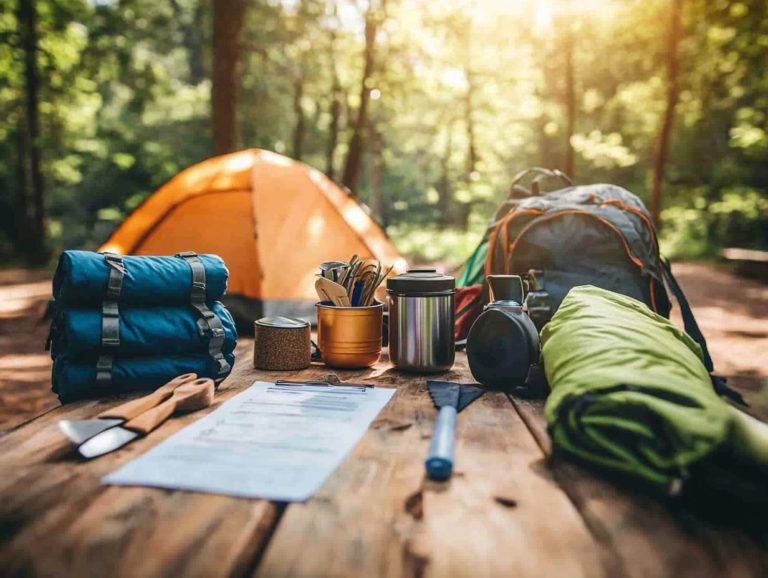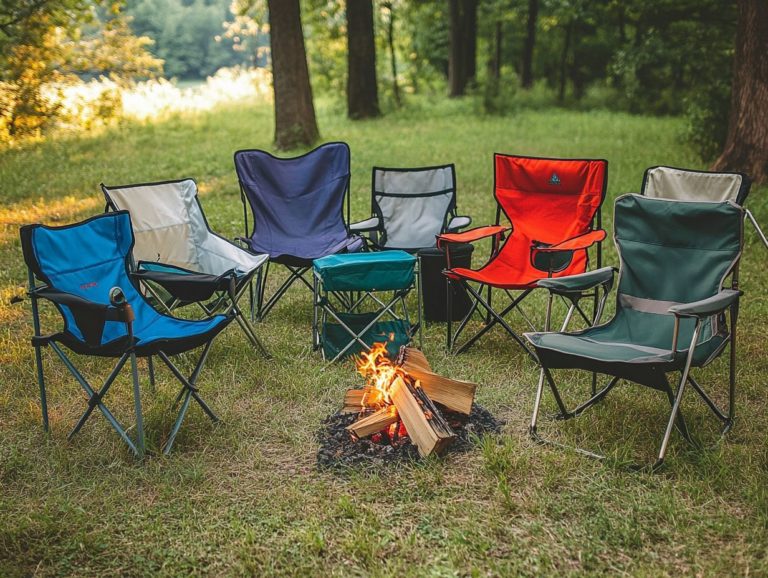5 Ways to Reduce Waste While Camping
Camping offers a magnificent opportunity to connect with nature, yet it frequently carries an overlooked consequence: waste.
As outdoor enthusiasts, it’s your duty to minimize your environmental footprint while reveling in the beauty of the great outdoors.
This article delves into five practical strategies for reducing waste on your camping excursions. From thoughtful meal planning to selecting eco-friendly gear, you’ll uncover straightforward yet impactful methods to embrace nature without leaving a trace.
Embrace the chance to make your next camping adventure more sustainable!
Contents
- Key Takeaways:
- 1. Plan Your Meals and Pack Accordingly
- 2. Use Reusable Containers and Utensils
- 3. Avoid Single-Use Items
- 4. Dispose of Waste Properly
- 5. Choose Eco-Friendly Camping Gear
- What Are the Environmental Impacts of Camping?
- Frequently Asked Questions
- What are 5 ways to reduce waste while camping?
- How can reusable containers and utensils help reduce waste while camping?
- Why is it important to properly dispose of trash and recyclables while camping?
- How can choosing products with minimal packaging help reduce waste while camping?
- Why is bringing a water filtration system important for reducing waste while camping?
- How can composting help reduce waste while camping?
Key Takeaways:
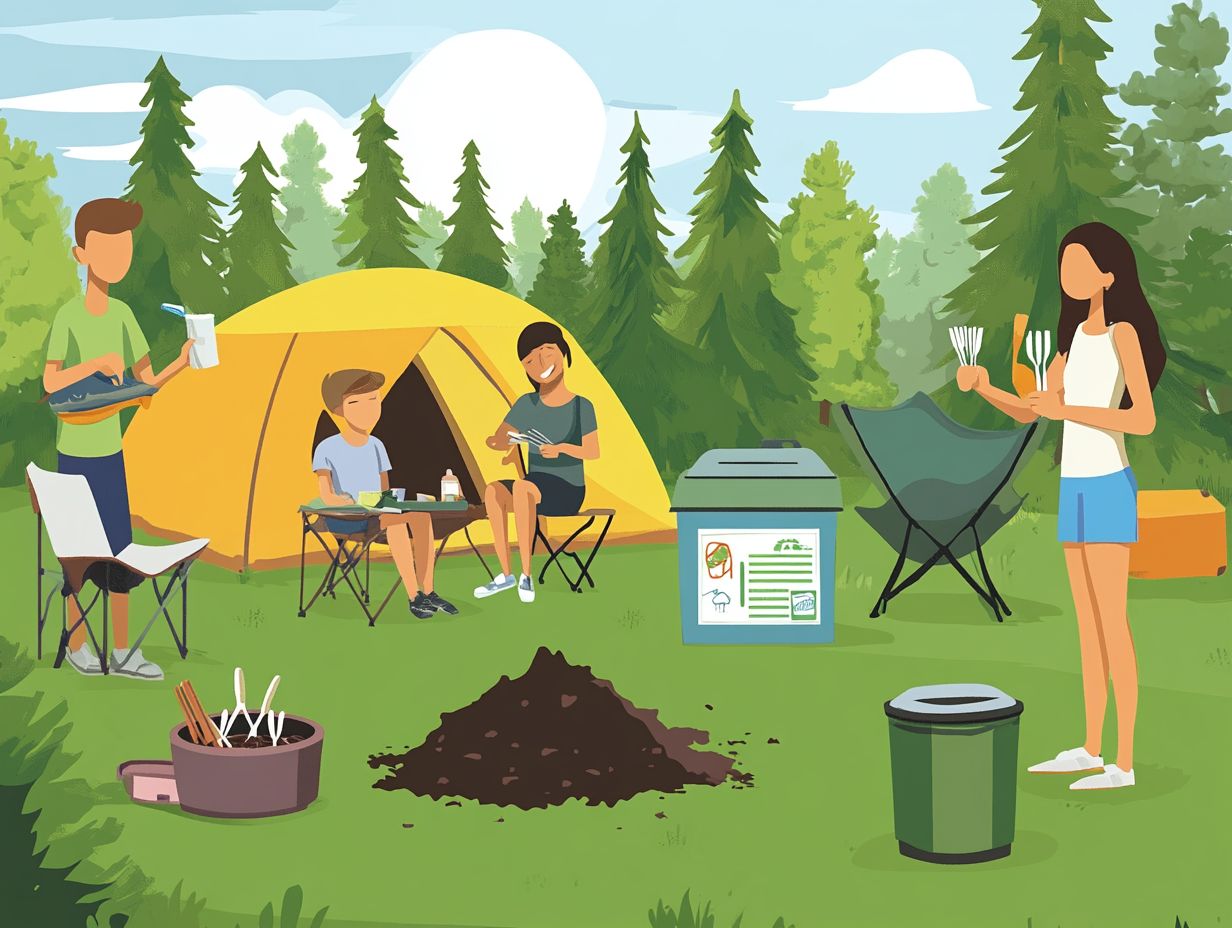
- Plan your meals and pack accordingly to reduce food waste while camping.
- Use reusable containers and utensils to limit single-use items and minimize waste.
- Properly dispose of waste to protect the environment and follow Leave No Trace principles.
1. Plan Your Meals and Pack Accordingly
Planning your meals and packing accordingly is essential for eco-friendly camping experience. By doing so, you minimize waste while savoring delicious, nutritious food during your outdoor adventures.
Selecting food packaging wisely and opting for biodegradable options that break down naturally over time allows you to have a positive impact on the environment while enjoying the beauty of nature.
Effective meal planning keeps your food fresh and significantly reduces the chances of bringing back unnecessary leftovers that typically end up in landfills.
Embracing easy, sustainable recipes simplifies cooking on the go and encourages versatile ingredient use.
Incorporating compostable materials, like utensils and plates, into your camping gear elevates your trash management practices.
As you embrace composting, it becomes a seamless way to handle organic waste, ensuring the beauty of nature remains unspoiled and clean.
These mindful choices not only enhance your outdoor experiences but also cultivate a deeper respect for the environment.
2. Use Reusable Containers and Utensils
Using reusable containers and utensils stands out as one of the most effective camping strategies to significantly reduce waste and minimize your reliance on single-use plastics during outdoor adventures.
By choosing options like Tupperware for meal prep and storage or a Hydro Flask for hydration, you not only elevate your outdoor experience but also play a vital role in environmental preservation.
These durable products are crafted to last, representing a smart investment that yields returns over time.
Choose durable utensils made of stainless steel or bamboo instead of disposable forks and spoons to greatly reduce the amount of waste you produce.
Incorporating these sustainable tools into your camping gear fosters responsible practices and inspires those around you to recognize the importance of minimizing waste during thrilling outdoor getaways.
3. Avoid Single-Use Items
Avoiding single-use items is a crucial strategy for responsible camping, as these products significantly contribute to camping waste and complicate your trash management efforts.
Consider plastic bags and single-use cutlery; they often end up littered in nature or improperly disposed of, polluting campsites and surrounding areas.
Instead of relying on plastic bags, you can opt for reusable cloth bags for food storage or laundry.
These small adjustments not only lessen environmental degradation but also foster a mindset geared toward waste reduction and recycling, positively impacting local ecosystems.
Make a conscious choice today for a cleaner tomorrow while camping!
4. Dispose of Waste Properly
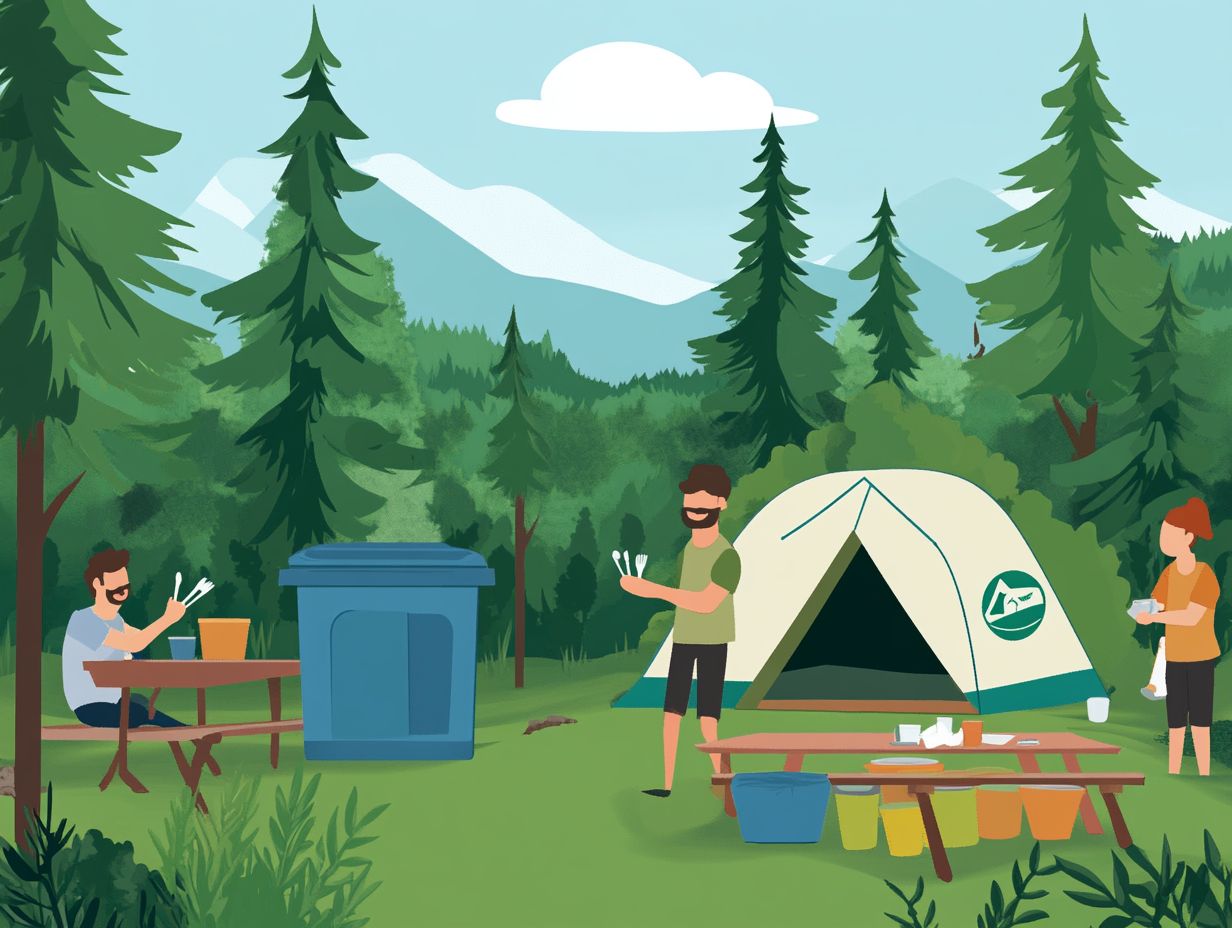
Properly disposing of waste is your essential responsibility as a camper. Embracing Leave No Trace principles means enjoying nature while leaving minimal impact.
Effective trash management ensures a cleaner experience for future campers and protects fragile ecosystems. Start by sorting your waste: keep recyclables, compostables, and landfill items separate.
Composting food scraps is beneficial during camping trips. Set up a designated compost area to manage waste efficiently and turn leftovers into nutrient-rich soil.
By adopting these strategies, you contribute to a healthier environment and enhance your outdoor experience.
5. Choose Eco-Friendly Camping Gear
Choosing eco-friendly camping gear elevates your outdoor experience while supporting sustainable practices. This helps minimize your environmental footprint.
Select biodegradable options like compostable utensils and tents made from renewable fabrics. Brands like BioLite and REI offer environmentally responsible solutions, ensuring your adventures leave minimal impact.
Assess each piece of gear for functionality and lifecycle impact. Opt for items made from recycled materials or those that promote fair trade to enhance your sustainability efforts.
What Are the Environmental Impacts of Camping?
Camping is a cherished activity, but it comes with significant environmental responsibilities. Understanding these impacts is essential for preserving nature’s beauty.
Careless behaviors, such as trampling sensitive vegetation or disturbing wildlife habitats, can cause lasting damage. Adopt an ecological mindset to ensure your camping adventures respect nature.
Embrace Leave No Trace practices to promote responsible outdoor enjoyment. Simple recycling hacks, like packing out waste or reusing materials, can significantly reduce your footprint.
What Are the Benefits of Reducing Waste While Camping?
Reducing waste while camping safeguards the environment and enhances your experience. It fosters sustainability and encourages the use of eco-friendly products.
Waste reduction improves campground cleanliness, creating a more enjoyable space for everyone. Clean sites contribute to a delightful atmosphere and help preserve wildlife habitats.
Less waste means fewer pests, leading to a more peaceful coexistence with nature. Responsible behaviors cultivate community and deepen your connection with the outdoors.
How to Plan for a Waste-Reducing Camping Trip?
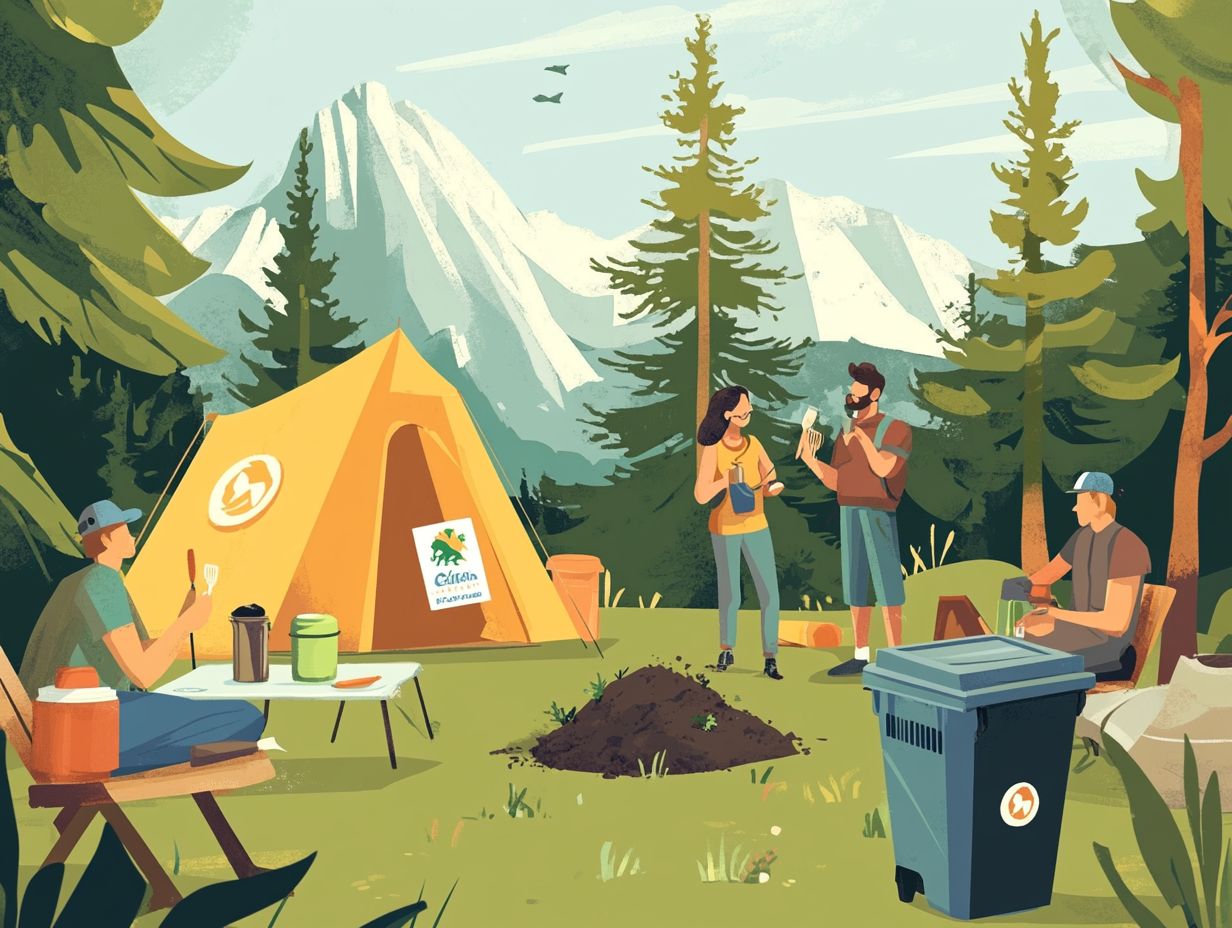
Planning a waste-reducing camping trip requires careful meal preparation, intentional packing, and a commitment to green practices that elevate sustainability.
Start by crafting a checklist of essential camping items that minimize waste. Incorporate reusable containers for food storage and preparation to eliminate single-use plastics.
Prioritize buying larger amounts of food to cut down on packaging waste, and plan your meals ahead of time to ensure you only bring what s necessary.
For snacks, choose fruits, nuts, or homemade trail mixes neatly stored in reusable bags. Don t forget eco-friendly utensils and plates to complete your waste-reducing setup.
These simple changes can make a big difference for the environment and enrich your overall camping experience.
What Are Some Common Sources of Waste While Camping?
Common sources of waste while camping often include food packaging, single-use plastics, and other disposable items that accumulate in natural environments.
To address this challenge effectively, you can prioritize using reusable containers for food storage, significantly reducing your reliance on plastic bags and wrappers.
Using compostable plates and utensils instead of plastic can also help cut down on landfill contributions. Choosing bulk items or fresh produce will further minimize excessive packaging waste.
By shifting your focus towards sustainable alternatives, you play a vital role in protecting natural ecosystems. This practice not only benefits the environment but also enriches your outdoor experience.
How to Practice Leave No Trace Principles While Camping?
Following Leave No Trace principles is essential for responsible camping; it allows you to minimize trail waste and preserve our beautiful outdoor spaces for future generations.
By embracing these guidelines, you can significantly reduce your impact on delicate ecosystems and ensure these environments remain pristine and inviting.
Here are seven key principles to follow:
- Plan ahead
- Travel and camp on durable surfaces
- Dispose of waste properly
- Minimize campfire impact
- Respect wildlife
- Be considerate of other visitors
Implementing these principles safeguards the flora and fauna and cultivates a sense of community among outdoor enthusiasts. Whether you re selecting the ideal campsite or learning to engage with wildlife responsibly, these ethical considerations enhance both the environment and your overall experience in nature.
What Are Some Creative Ways to Reuse Items While Camping?
Finding creative ways to reuse items while camping can significantly reduce waste and enhance your outdoor experience, transforming potential trash into valuable tools.
By thinking outside the box, you can uncover innovative recycling hacks that save you money and space in your gear. For example, repurposing old coffee cans as cooking pots or using empty plastic bottles for oil or spices turns everyday waste into practical camping necessities.
Even common items like bandanas can serve multiple purposes acting as a towel or providing shade from the sun. Embracing these recycling ideas nurtures a sustainable mindset and adds joy as you discover clever solutions in nature.
Frequently Asked Questions
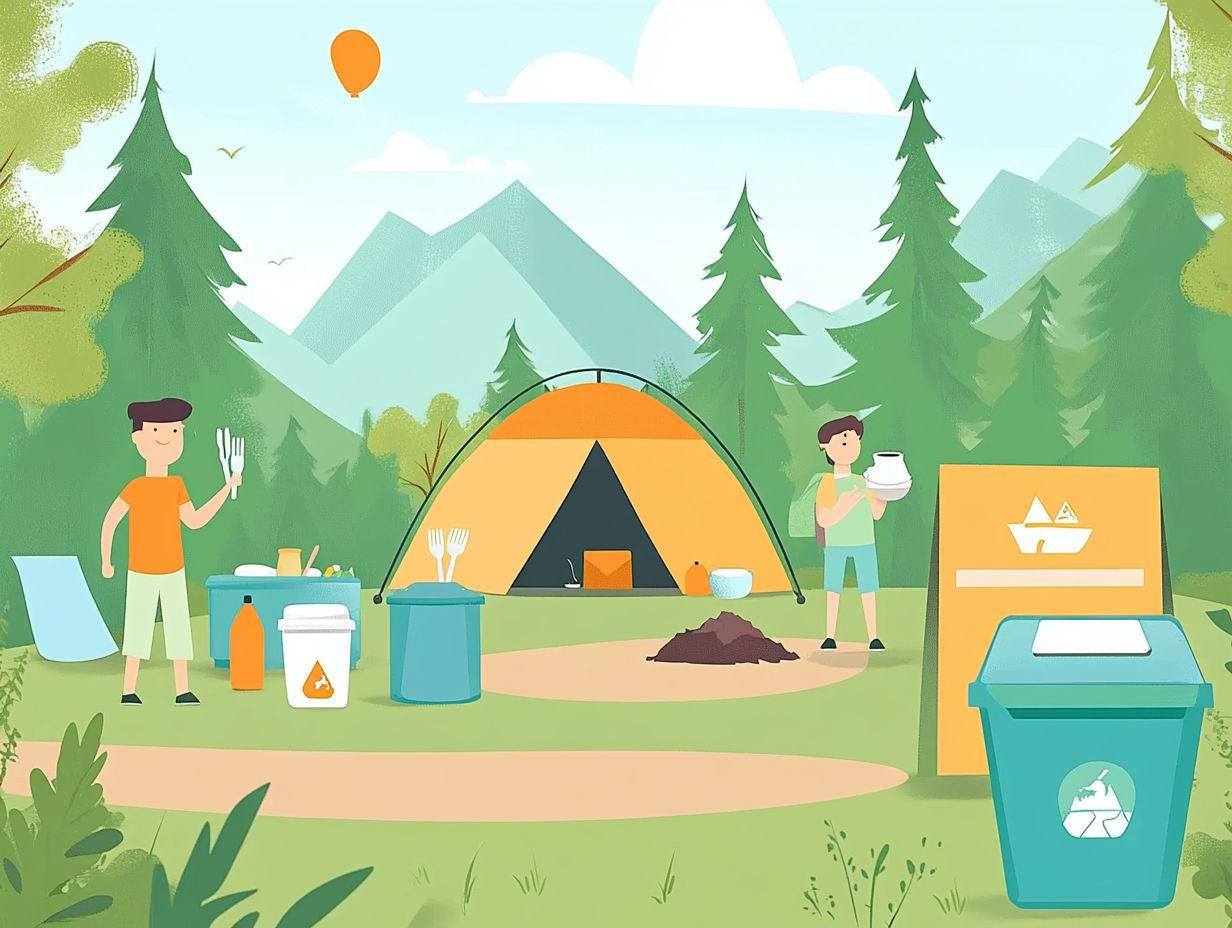
What are 5 ways to reduce waste while camping?
1. Use reusable containers and utensils. These replace disposable items that clutter our planet.
2. Dispose of trash and recyclables in designated bins to keep the area clean.
3. Choose products with little packaging to minimize waste.
4. Bring a water filtration system to avoid single-use plastic bottles.
5. Compost food scraps to create nutrient-rich soil for the future.
How can reusable containers and utensils help reduce waste while camping?
Using reusable containers and utensils eliminates single-use disposable items. This not only reduces waste but also helps preserve the natural beauty of our camping areas. Act now to keep our camping spots beautiful!
Why is it important to properly dispose of trash and recyclables while camping?
When you dispose of trash and recyclables correctly, you protect wildlife and maintain a clean environment. Follow the campsite’s waste management guidelines or bring your own trash bags and recycling bins. Let s make a difference together!
How can choosing products with minimal packaging help reduce waste while camping?
Products with excessive packaging create unnecessary waste in camping areas. By selecting items with minimal packaging, you help reduce waste generation. Look for eco-friendly packaging or consider buying in bulk. Every little bit helps!
Why is bringing a water filtration system important for reducing waste while camping?
Bringing a water filtration system eliminates the need for single-use plastic bottles. This step significantly reduces plastic waste while saving you money on bottled water. Let s protect our environment together!
How can composting help reduce waste while camping?
Composting food scraps turns them into nutrient-rich soil, reducing waste in camping areas. Use a designated compost bin or pit and follow proper guidelines to avoid attracting pests. Together, we can enrich our camping spots and protect nature!


